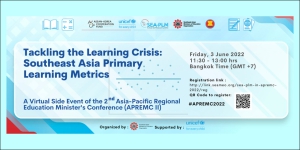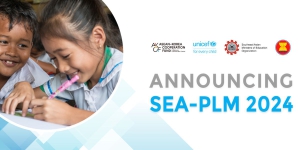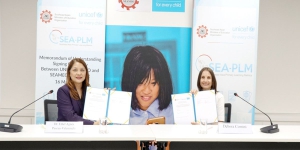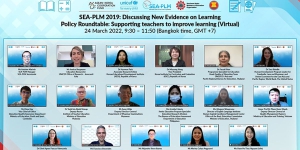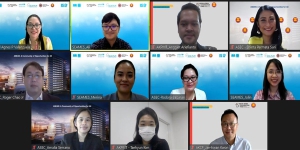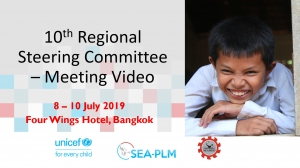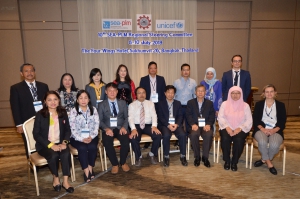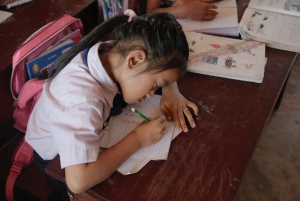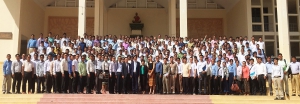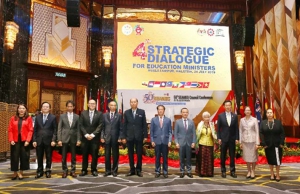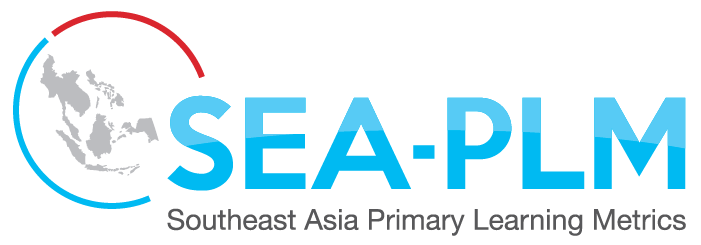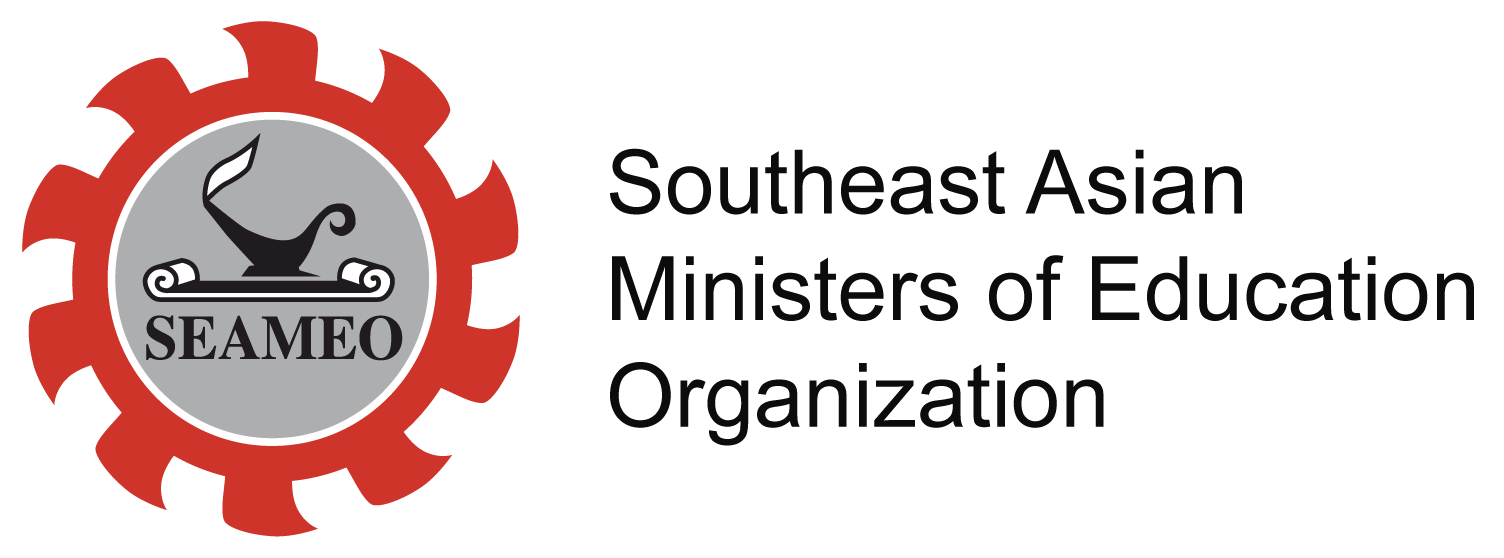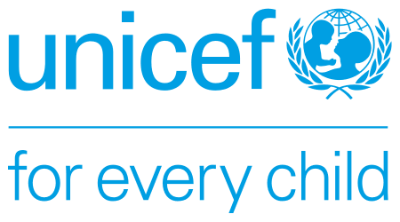"Tackling the Learning Crisis: Southeast Asia Primary Learning Metrics" | APREMC-II Side Event
As Southeast Asian countries continue to manage the impacts of the COVID-19 pandemic in education, continuing investment in global competencies and academic learning data and system and school policy exchange is critical to improving the quality of education and learning across the region.
SEA-PLM Secretariat, co-chaired by the UNICEF Regional Office for East Asia and Pacific (UNICEF EAPRO) and the Southeast Asian Ministers of Education Organization (SEAMEO) Secretariat, will organize the virtual side event "Tackling the Learning Crisis: Southeast Asia Primary Learning Metrics"during the Asia-Pacific Regional Education Minister’s Conference (APREMC-II) on Friday, 3 June 2022, 11:30–13:00, (Bangkok time, GMT +7).
The event will bring together experts to present and discuss the findings of SEA-PLM 2019 main regional reports, the new evidence on Low Performing Readers, Boys and Girls Learning, and Supporting Teacher, as well as ongoing national policies and plan for supporting primary learning in Southeast Asia.
The Southeast Asia Primary Learning Metrics (SEA-PLM) is a regional learning assessment and capacity-building programme designed by and for Southeast Asian countries to improve relevant and equitable learning outcomes for students in basic education. The SEA-PLM programme provides a unique space for experts from participating countries and programme’s mentors to discuss system and school level implications to address the learning crisis (short, middle, and long term) to build better resilient, equitable, and inclusive systems.
Invitees can attend the side event virtually via Zoom Webinar.
Concept Note and Provisional Programme
Webinar Proceedings [to be updated]
Announcing SEA-PLM 2024
What is new in SEA-PLM 2024? Building on the success of SEA-PLM 2019, the new round of assessment SEA-PLM 2024 will continue to transform into a more sustainable programme for delivering comparative students' learning trends over time through cyclic rounds of implementation and boosting policy exchange and collaboration. SEA-PLM 2024 will present new opportunities for engaging stakeholders, forging partnerships, motivating new countries to participate and improving the efficiency of the operating model. It will include additional activities for CLMV countries: Cambodia, Lao PDR, Myanmar and Vietnam.
Furthermore, the complementary nature and interrelatedness of the programme's Pillars 1, 2 and 3 will support regional policies and practices in basic education and produce substantial links between evidence with policy formulation, design, and implementation.
For more details regarding the new phase multi-year plan, participation conditions and registration, please get in touch with the SEA-PLM Secretariat through email: This email address is being protected from spambots. You need JavaScript enabled to view it.
SEA-PLM is designed by and for Southeast Asian countries
Since its inception in 2012, the SEA-PLM programme has grown into a recognized regional learning assessment and capacity-building programme designed by and for Southeast Asian countries. The SEA-PLM programme is designed to support and address the different needs of each participating country—to help countries strengthen their learning assessment systems and facilitate evidence-based decision-making to improve learning outcomes.
SEA-PLM 2019, the programme's first assessment cycle, has played a vital role in creating informed decisions at the country and system-wide levels. The SEA-PLM programme is competent with knowledge, capacity-building tools, support for policy dialogue, and technical staff expertise to assist partners.
SEA-PLM 2024 is timely
The role of SEA-PLM's learning assessment programme is critical in the post-COVID-19 era. Learning assessments such as SEA-PLM are vital in evaluating students' learning, supporting learning recovery and achieving better learning outcomes by enhancing the capacity to measure learning outcomes, use evidence and data, and allow for peer exchange on policies and practices.
SEA-PLM 2024 partners
For SEA-PLM 2024, the programme has mobilized substantial technical and financial regional resources through the ASEAN Secretariat and the ASEAN-Republic of Korea Cooperation Fund (AKCF), UNICEF EAPRO, SEAMEO Secretariat, and the official support from Southeast Asian Ministers. These partnerships are paramount in strengthening SEA-PLM's relevance and sustainability in fostering regional cohesion and improving assessment, learning, and equity in basic education in the region.

SEAMEO and UNICEF commit to improve learning outcomes for millions of children across Southeast Asia
The Southeast Asia Ministers of Education Organization (SEAMEO) and UNICEF East Asia and Pacific Regional Office (EAPRO) signed a Memorandum of Understanding (MoU) to renew and strengthen its partnership to co-lead the Southeast Asia Primary Learning Metrics (SEA-PLM) Programme. Dr Ethel Agnes Pascua-Valenzuela, Director, SEAMEO Secretariat and Debora Comini, Regional Director, UNICEF East Asia and Pacific, signed the MoU. This continued collaboration is significant for the SEA-PLM programme as it prepares for the second cycle of assessments—SEA-PLM 2024.
"This is a good example of commitment and partnership, and it's not a one-way street, but it's always two ways, and in the end, the countries benefit from our partnership," said Dr Ethel Agnes Pascua-Valenzuela, Director, SEAMEO Secretariat. "Co-management of SEA-PLM is what we are signing today for the second round [SEA-PLM 2024], which will run from today up to 2025, and we are delighted that the Ministers of Education also approved our strategic plan of 2021-2025. This day will not be forgotten. It will be in the history of our organizations that even during a pandemic, we can collaborate, we can talk, and we can sign this memorandum of understanding."
"This MoU illustrates the productive collaboration between SEAMEO and UNICEF and the importance we jointly place on the education of children in Southeast Asia. Our teamwork has already helped countries in the region to strengthen their policies and practices to improve learning for all children, especially those who are hardest to reach. You are champions to drive education in Southeast Asia, and we look forward to our ongoing partnership," said Debora Comini, Regional Director, UNICEF East Asia and Pacific. "The MoU formalizes our respective roles at the [SEA-PLM Regional] Secretariat, and UNICEF is again committed to providing all the support we can, including at the technical level."
Since 2012, SEAMEO and UNICEF EAPRO have collaborated to assess, monitor and improve the quality of primary education in Southeast Asia. Together, they launched the SEA-PLM 2019 assessment—the first large-scale learning assessment by and for Southeast Asian countries—culminating in 2020 with the SEA-PLM 2019 Main Regional Report. The report presented rich data, findings, and recommendations to develop robust learning assessment systems and inform practices in key policy areas to the six participating countries: Cambodia, Lao PDR, Malaysia, Myanmar, Philippines, and Vietnam.
The partnership between SEAMEO and UNICEF and member countries is a core principle of the SEA-PLM programme. The SEA-PLM Regional Secretariat co-managed by SEAMEO Secretariat and UNICEF EAPRO coordinates the programme's day-to-day management, including technical, administrative, communication, and strategic activities under SEA-PLM programme pillars to support long-term programme goals.
Through this MoU, SEAMEO and UNICEF EAPRO agrees to commit and work towards a shared objective — to provide better learning outcomes and equity in education for millions of children across the region.
About SEA-PLM
The Southeast Asia Primary Learning Metrics (SEA-PLM) is the first regional large-scale learning assessment programme specifically designed by and for the Southeast Asian region to assess the learning outcomes of Grade 5. It aims to improve students' foundational learning, inform policy-making to achieve meaningful learning and monitor ASEAN performance to attain equitable and quality education for all. For more information about the SEA-PLM Programme, visit https://www.seaplm.org/
About SEAMEO
The Southeast Asian Ministers of Education Organization (SEAMEO) is a regional intergovernmental organization established in 1965 among governments of Southeast Asian countries to promote regional cooperation in education, science and culture in the region. The organisation's highest policy-making body is the SEAMEO Council, which comprises the 11 Southeast Asian education ministers. The SEAMEO Secretariat is located in Bangkok, Thailand. For more information about the SEAMEO Secretariat, visit https://www.seameo.org/w5
About UNICEF
Stretching from Mongolia in the North to Tonga in the South, UNICEF's East Asia & Pacific Regional Office covers one of the world's most diverse and dynamic areas. UNICEF promotes the rights and wellbeing of every child. Together with partners, UNICEF works in 190 countries and territories to translate that commitment into practical action, focusing special effort on reaching the most vulnerable and excluded children to the benefit of all children. For more information about UNICEF East Asia & Pacific and its work for children, visit www.unicef.org/eap
Policy Roundtable: SEAMEO member countries and experts discuss SEA-PLM’s new evidence to support teachers for learning post-COVID-19 in Southeast Asia
On March 24, the SEA-PLM Secretariat convened a virtual roundtable to discuss existing challenges and gaps to inform policy discussions for effectively recruiting, training and managing teachers. The roundtable drew together 90 participants to discuss the findings of the new evidence SEA-PLM 2019 latest evidence in basic education: Supporting teachers to improve learning in 6 Southeast Asian countries, published by the SEA-PLM Secretariat. In his opening remarks, Mr Francisco Benavides, Regional Education Advisor, UNICEF EAPRO, spoke on the urgency and relevance of the webinar. He underscored teachers as "critical drivers to children's learning and are the basis of a better education system."
Mr Antoine Marivin, SEA-PLM Manager and Ms Jessica Bergmann, Education Researcher, UNICEF Office of Research – Innocenti, presented the new SEA-PLM evidence. Mr Antoine highlighted the importance of the latest findings to "encourage countries to share successes, experiences and challenges to increase teachers' workforce capacity, support school reopening and building a resilient academic system." Ms Jessica Bergmann pointed out that "countries should create opportunities to build teachers' confidence and competency and invest in ICT support to strengthen resilience for unforeseen disruptions in education systems." She added that judiciously designed programmes would help teachers acquire core competencies and skills according to each country's context.
The new evidence is particularly relevant. As countries speed up learning recovery post-COVID-19, teachers' competency and supportive working environment are crucial to accelerating the learning recovery to advance learning for all students, especially the most marginalized. Dr Faryal Khan, Programme Specialist for Education, UNESCO, commented on the report's significance following the COVID-19 crisis, which compromised children's learning. She also stressed how the "SEA-PLM programme's research and evidence are critical to advancing transformative education and has implications for informing UNESCO's policy and practices to support teachers."
Dr Tara Béteille, Senior Economist East Asia Pacific region, World Bank, asserted that the report with robust evidence "forms a solid basis for approaching governments" and decision-makers. This is evident in participating countries such as Cambodia. Findings and recommendations from the SEA-PLM 2019 study have influenced educational policy reforms, and reforms are in the pipeline to improve pre-service education of teachers, ICT support and preparing teachers' data management systems.
The webinar also brought in expert commentaries from Dr Miyoung Hong, Vice President, Korea Institute for Curriculum and Evaluation (KICE). Dr Miyoung Hong shared efficacious practices and examples in Korea that can be tailored to the needs of each country, such as Korea's process-oriented evaluation, to apply revised curriculum successfully.
Following the presentation from key experts, SEAMEO member countries presented different perspectives and approaches to the table. They shared their experiences and reflection on the study, existing policies and challenges in supporting teachers to improve learning in their respective countries.
Dr Ethel Agnes Pascua-Valenzuela, Director, SEAMEO Secretariat, ended the roundtable on a hopeful note. "Listening to extraordinary thought leaders of the region, the recommendations and analysis made during this policy roundtable will be considered, and satisfactory progress can be expected," said Dr Ethel Agnes Pascua-Valenzuela in her closing remark.
The virtual roundtable was part of the policy dialogue series organized by the SEA-PLM Secretariat, the Southeast Asian Ministers of Education Organization (SEAMEO) Secretariat and UNICEF Regional Office for East Asia and Pacific (EAPRO). It explores compelling new evidence based on the results and data of the SEA-PLM 2019 report. Through such policy discussions, the SEA-PLM programme aims to establish a policy community in the region where partners, experts and countries can come together and exchange robust dialogue to advance children's learning, especially learning recovery post-COVID 19.
First SEA-PLM Project Steering Committee Convened
The first SEA-PLM Project Steering Committee Meeting was held on 23 March 2022. The gathering, held virtually, was jointly organised by the SEA-PLM Secretariat, the SEAMEO Secretariat, ASEAN Secretariat (ASEC), and ASEAN-Korea Cooperation Fund (AKCF). Representatives from the SEAMEO Secretariat, the Human Development Directorate and Education, Youth & Sports Division of ASEC, and the ASEAN-Republic of Korea Programme Management Team (AKPMT) attended the meeting. Dr Ethel Agnes Pascua-Valenzuela, Director, SEAMEO Secretariat, officially convened the SEA-PLM Project Steering Committee Meeting as a viable platform for close coordination and collaboration with partner organizations for the success of the SEA-PLM project.
Dr Ethel Agnes Pascua-Valenzuela expressed the benefit of convening steering committee meetings that stress the importance of synergy between the project proponents and project funders in project conception, revision, and implementation. Mr. Anggiet Ariefianto of AKPMT stressed the importance of project accountability and sustainability and highlighted adhering to ASEAN's project criteria and guidance.
Discussions included formulating the steering committee structure and meeting modalities and advocating the SEA-PLM programme to diplomatic communities of the region. The project's progress and planned activities were presented during the meeting, and modifications to adapt to the ongoing COVID-19 pandemic were also proposed to navigate the current situation in ensuring the success of program implementation.
The SEA-PLM Project Steering Committee Meetings will enable partners and stakeholders to convene and discuss the programme's critical strategies, such as mitigating financial and technical issues, providing the required resources, and reporting project progress and changes. The next SEA-PLM Project Steering Committee Meeting is proposed to be held in November of this year.
Video of 10th Regional Steering Committee for SEA-PLM
Ministry of Education officials from across Southeast Asian nations came together in July 2019 at the 10th Regional Steering Committee meeting to discuss the first assessment round of Southeast Asia Learning Primary Learning Metric (SEA-PLM 2019). Looking ahead to 2020 in preparation for the final steps of this long-awaited assessment round, this meeting built regional consensus for the effective dissemination and use of results.
Consultation platforms such as the 10th Regional Steering Committee meeting are vital in aligning national and regional approaches, and to coordinate resources and efforts in the coming months to explore communication appraoches and reporting strategies.
Enjoy watching this video about the proceeding of the 10th Regional Steering Committee for SEA-PLM to stimulate future discussion around results and create new learning opportunities.
10th Regional Steering Committee strengthens regional dialogue for SEA-PLM
A key distinguishing factor of the Southeast Asia Primary Learning Metrics (SEA-PLM) is that it is entirely embedded into existing national and regional systems and structures. At the centre of its governance structure sits the Regional Steering Committee (RSC). Composed of core and honorary members, core being those countries participating in SEA-PLM, and honorary being non-participating ASEAN and SEAMEO Countries and key partners, the RSC is responsible for the strategic direction of SEA-PLM.
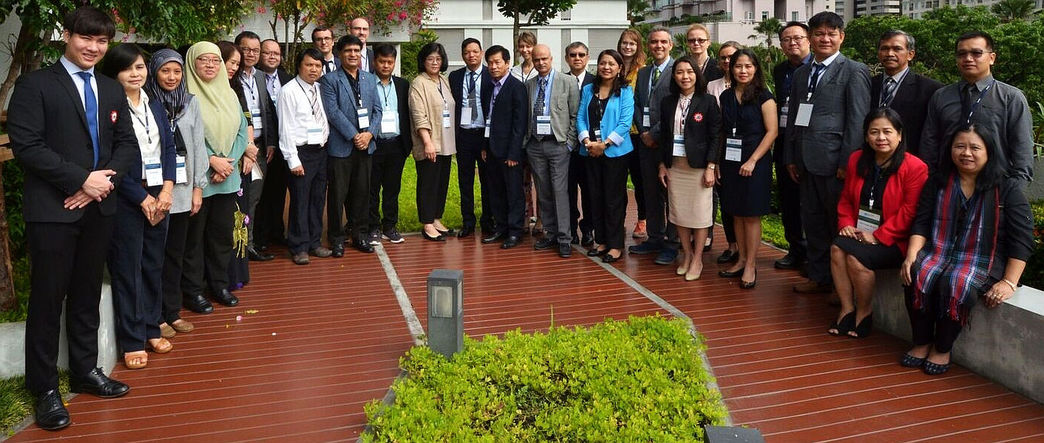 In July 2019, the 10th Regional Steering Committee for SEA-PLM was held in Bangkok. 2019 represents a significant milestone for SEA-PLM with data being collected for the first assessment round SEA-PLM (SEA-PLM 2019). The meeting focused on preparing countries for the analysis, dissemination and use of results in 2020. Held over two and half days, countries and participants shared their experiences of using national, regional and international large-scale learning assessments to improve learning policy, looking particularly at the possibilities for analysis and ways to maximise use of data. Reflecting on and integrating these experiences are essential for a new regional learning assessment such as SEA-PLM.
In July 2019, the 10th Regional Steering Committee for SEA-PLM was held in Bangkok. 2019 represents a significant milestone for SEA-PLM with data being collected for the first assessment round SEA-PLM (SEA-PLM 2019). The meeting focused on preparing countries for the analysis, dissemination and use of results in 2020. Held over two and half days, countries and participants shared their experiences of using national, regional and international large-scale learning assessments to improve learning policy, looking particularly at the possibilities for analysis and ways to maximise use of data. Reflecting on and integrating these experiences are essential for a new regional learning assessment such as SEA-PLM.
Hosted by SEAMEO Secretariat and UNICEF EAPRO, the meeting was attended by represetatives from the six participating countries Cambodia, Lao PDR, Philippines, Malaysia, Myanmar and Vietnam, as well as honorary representatives from Brunei Darussalam, Singapore and Thailand, and key partners, the Australian Council for Educational Research, UNESCO Bangkok and the UNESCO Institute for Statistics.
SEA-PLM is designed to create regional dialogue around quality learning in Southeast Asia, the RSC provides the platform for this exchange.
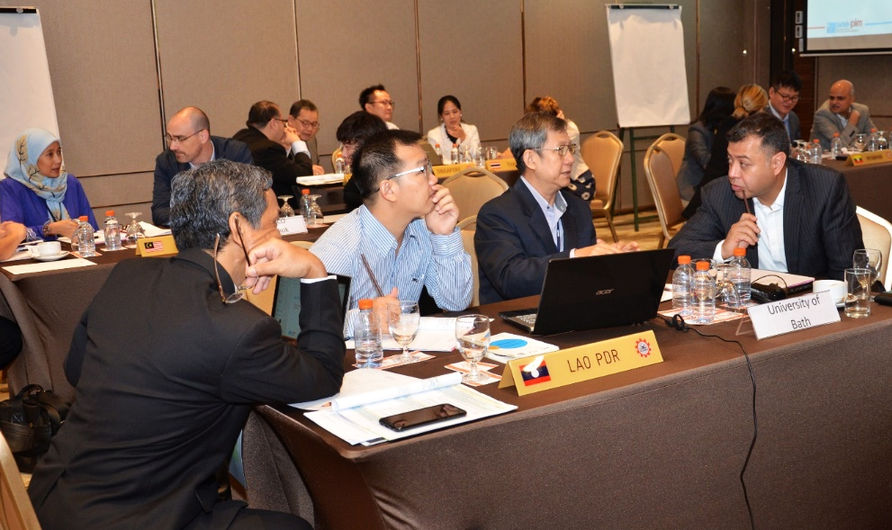
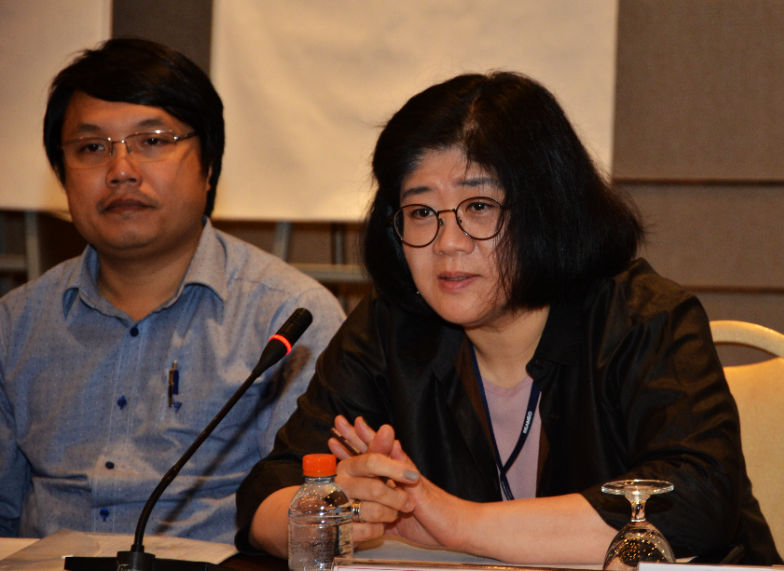 As well as these members, joining the Committee for the first time were Co-Chairs of the newly created Technical Advisory Group (TAG). Established for the purpose of providing independent scientific and technical advice on SEA-PLM methodology and data, Co-Chairs and learning assessment experts Dr Andres Sandoval from the University of Bath and Dr Jimin Cho, Director of the Korean Institute of Curriculum and Evaluation (KICE) proved themselves to be valuable additions to the discussion.
As well as these members, joining the Committee for the first time were Co-Chairs of the newly created Technical Advisory Group (TAG). Established for the purpose of providing independent scientific and technical advice on SEA-PLM methodology and data, Co-Chairs and learning assessment experts Dr Andres Sandoval from the University of Bath and Dr Jimin Cho, Director of the Korean Institute of Curriculum and Evaluation (KICE) proved themselves to be valuable additions to the discussion.
Along with other key partners, both Co-Chairs presented important insights into the realities of planning and implementing for the analysis, reporting and dissemination phases, supported countries to look towards the year ahead and deepen their understanding of the steps and issues that require national consideration and agreement.
SEA-PLM 2019 results will be captured in one main regional report and six country level reports. The process to developing, reviewing and releasing these reports is fraught with a multitude of variables with the potential to impact the use of results. It is vital to the success of SEA-PLM 2019 that all activities and potential barriers are mapped out and planned in detail.
As UNICEF Regional Education Advisor Francisco Benavides and Co-Chair of the Regional Steering Committee stressed, it is through the collective effort at the regional and national level that has both enabled the creation of SEA-PLM and will be central to its success. With 2020 to present increasingly more technical and logistical challenges on a constrained calendar, it is ever more important that these partnerships are maximized on to deliver the vision of SEA-PLM.

Regional Learning Assessment to Help Lao Government Better Understand Student Learning Outcomes and How to Improve Them
"Learning means knowledge, and getting a job", said 10-year-old Phoudthalith, sitting under the shade of a tree outside her small classroom in Vientiane.
For Phoudthalith, and many of her friends, the priority is getting good grades in Lao language and mathematics, learning by rote from the blackboard. When asked about what the most fun part of learning is, Phoudthalith looks uncertain about how to answer.
Across Southeast Asia, teachers, schools and governments are trying to move from a knowledge-based curriculum to one based on competency, with a focus on critical thinking and developing skills that can be transferred outside the classroom. Lao PDR is in the process of transforming its primary school curriculum, improving teacher training and placing resources where they can best help student learning outcomes.
But to do this, Governments need to know where they are at right now and how to develop strategies to improve.
One of the key tools for this is the Southeast Asian Primary Learning Metrics (SEA-PLM), being of UNICEF and Southeast Asian Ministers of Education Organisation (SEAMEO), in close collaboration with the Ministries of Education in the region.
Put plainly, SEA-PLM is a regional learning assessment - the large-scale collection of data on student learning outcomes from schools across Southeast Asia, and the use of that information to inform curriculum development, teacher training and education policy.
Collecting this data in line with standardized practices in places like Lao PDR presents many challenges for the teams charged with coordination and communication.
From calling hundreds of schools to ask for up-to-date student lists to training and organising 216 test administrators to travel to schools across the country, the Lao technical team based at the Research Institute for Educational Sciences (RIES) in Vientiane have learnt many valuable lessons when it comes to planning and communication. These are skills that not only apply to SEA-PLM, but can be used in the design and management of national assessments.
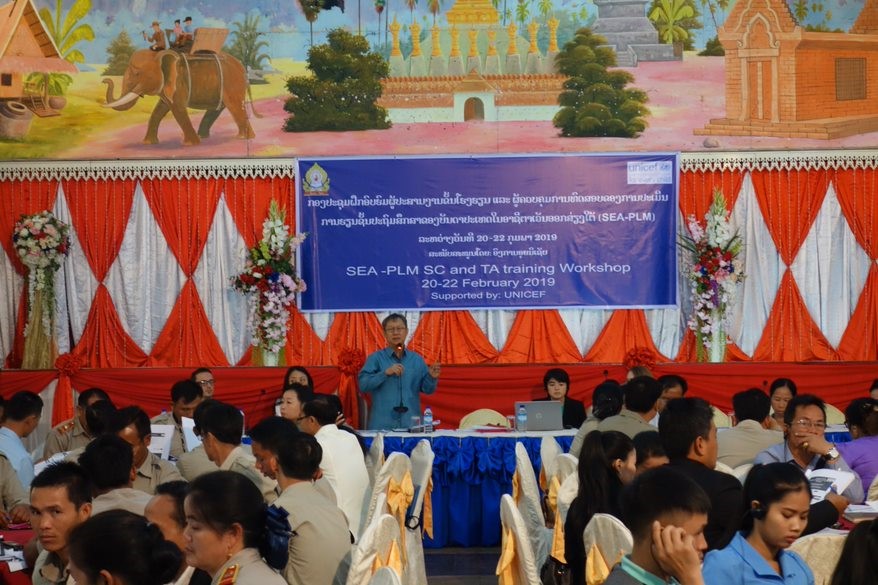
Just as a microscope is adjusted to the correct lens to see specific cells, so does the Southeast Asia Primary Learning Metrics (SEA-PLM) provide the tools and criteria to meet a more dynamic approach to learning. Students complete assessment booklets in the areas of reading, writing, mathematics and global citizenship, engaging in both knowledge and competency based questions.
But SEA-PLM goes deeper than this.
Test administrators also have parents, teachers and principals complete questionnaires to gain an understanding on the context in which children learn. What was the level of pre-reading before entering school? Is gender an issue? Are students being supported to do their homework and do they have access to learning material at home? SEA-PLM enables deeper level analysis of why students are and aren't learning well.
The Lao technical team have been working in collaboration with the UNICEF Lao Country Office and the Australian Council for Education Research (ACER) to prepare for the collection of data for many months now. From the 30th April until 8th May Lao PDR implemented data collection for SEA-PLM.
Now, the Lao technical team members will begin marking and coding the written answers in the booklets into a code that can be compared against tests in other countries and other languages. The results from all six Southeast Asian nations involved will be compiled in one unique and complex regional database to allow reliable analysis on the level of student outcomes and equity at the regional, national and sub-national level.
The learning assessment will give an empirical snapshot of how countries, schools, pupils are faring in specific areas according to their environment for instance, type of difficulties in reading comprehension between socio-economic backgrounds or how girls and boys are learning.
For each country, the data will provide the opportunity to make informed decisions on how to shape policy and where to place resources.
For the individuals involved in the data collection and analysis, there will be specific skills learned that can translate to other areas of research and hopefully, a broadening of their understanding about what education could and should look like in cities and villages across Lao PDR.
And for children like Phoudthalith, and perhaps her children in the future, the idea of learning might be less about remembering what gets written on the blackboard, but how to learn and where that might take them.
Cambodia Prepares Test Administrators in Battambang
From June 10th until12th the Cambodian Technical Team organised the training of over 250 Test Administrators and School Coordinators at Battambang University, Battambang. All SEA-PLM participant countries implement a standardized training to those selected to coordinate and administer the tests to students and questionnaires to students, parents, teachers and principals. This is to ensure the same steps and script is applied consistently across all schools.
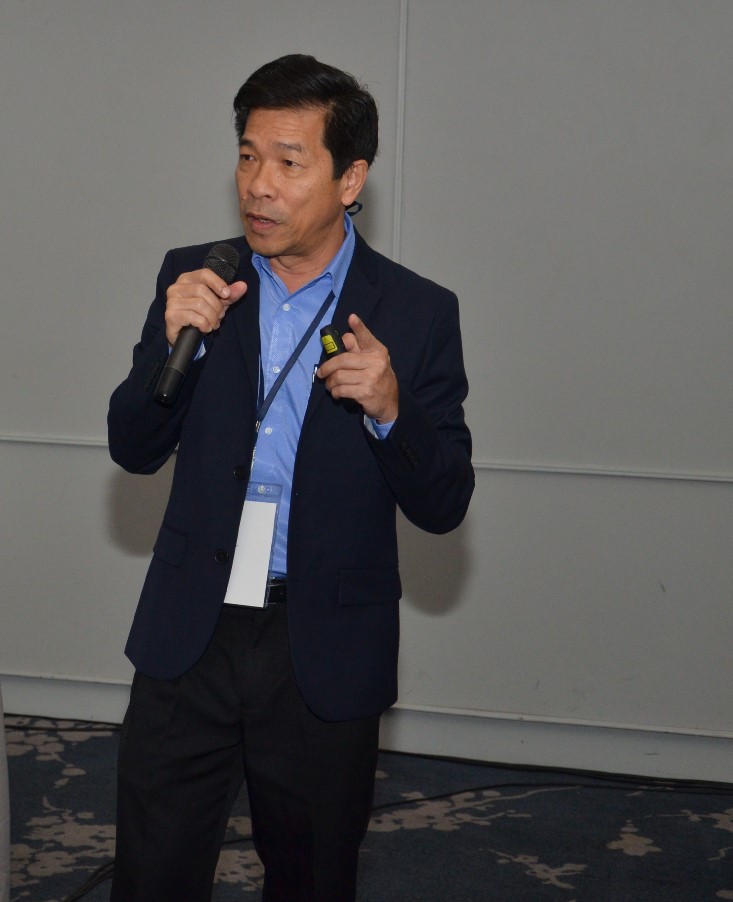 Learning assessment, described by Director of Education Quality Assurance Department (EQAD) Mr. Ung Chinna as the current "pop-star of education" in Cambodia, is receiving increased emphasis at the policy level, promoting the better use of information generated through assessment to form the basis of education reform across relevant departments and key stakeholders. SEA-PLM plays an important role in this transition. Through providing capacity development to EQAD staff in how to manage large-scale assessments at international standards, the team are able to apply these standards to national and international assessments, and increasingly advocate for the need of assessment from the national to school level.
Learning assessment, described by Director of Education Quality Assurance Department (EQAD) Mr. Ung Chinna as the current "pop-star of education" in Cambodia, is receiving increased emphasis at the policy level, promoting the better use of information generated through assessment to form the basis of education reform across relevant departments and key stakeholders. SEA-PLM plays an important role in this transition. Through providing capacity development to EQAD staff in how to manage large-scale assessments at international standards, the team are able to apply these standards to national and international assessments, and increasingly advocate for the need of assessment from the national to school level.
It is also through the support of major partners such as UNICEF that this growing focus and capacity in using learning assessments to identify gaps and inform educational reform is achieved. UNICEF Cambodia is a vital partner for SEA-PLM in Cambodia, contributing both funding and organisational support to its implementation.
The training, mostly delivered by Technical Team Manager Mr. Sar Sarin, was attended by representatives from the Ministry of Education, Youth and Sports, UNICEF Country Office, SEAMEO Secretariat and the Australian Council for Education Research (ACER).
The 4th Strategic Dialogue for the Education Ministers
H E Dr Maszlee Malik, Minister of Education Malaysia and SEAMEO Council President welcomed the delegates to the 4th Strategic Dialogue for Education Ministers (SDEM) and invited them to listen to some expert perspectives on Sustainable Development Goals specifically on Inclusive and Equitable Education and Lifelong Learning, Technology and the Future of Education as well as Partnership and Collaboration for the Future of Education. In his remarks, he pointed out that the forum is directed to cover issues and progress that support the implementation of the SEAMEO Education Agenda and 7 Priority Areas toward the achievement of UN Sustainable Development Goal No. 4.
The 4th Strategic Dialogue for Education Ministers was led by the SEAMEO Secretariat in collaboration with UNESCO Bangkok Office. There were roundtable sessions with highly respected speakers to deliver thematic keynote presentations.
Session I Theme: Sustainable Development Goals and the Implications for the Inclusive and Equitable Education and Lifelong Learning in Southeast Asia
 In this session, Mr. Shigeru Aoyagi presented UNESCO's views on the Sustainable Development Goals (SDGs) by outlining three key messages;
In this session, Mr. Shigeru Aoyagi presented UNESCO's views on the Sustainable Development Goals (SDGs) by outlining three key messages;
- Southeast Asia (SEA) countries are not on track to achieve the SDGs.
- SEA will not achieve the SDGs by 2030, particularly SDG4 with current practices.
- SEA must change according to current times and trends.
He reiterated that the SDGs must be reinterpreted critically in light of the new challenges of current times and the shifting demands from the job market. He urged SEAMEO members to discuss, deliberate and determine the next key recommendations that will consider these issues.
This session was followed by a roundtable discussion led by Ms Azlina Kamal, an Education Specialist of UNICEF Malaysia as the moderator. The session aims to get the reflections, insights as well as experiences on the said theme from the panelists H E Dr Maszlee Malik, Minister of Education, Malaysia; H E Assoc Prof Dr Khamphay Sisavanh, Deputy Minister of Education and Sports, Lao PDR; H E Dr Leonor Magtolis Briones, Secretary of Education, Philippines; and H E U Win Maw Tun, Deputy Minister of Education, Myanmar.
Session II Theme: The Future of Education: Leveraging Technology in Artificial Intelligence (AI) and Machine Learning for Quality and Equitable Education
In this session, Dr Fengchun Miao, Chief of the Unit for ICT in Education, UNESCO Headquarters presented the future of education to address leveraging Artificial Intelligence (AI) to achieve SDG 4 - Education 2030 by outlining the issues include:
- How to ensure ethical, inclusive & equitable use of AI in education?
- How can education prepare humans to live and work with AI?
- How can AI be leveraged to enhance or reinvent education?
In this opportunity also, UNESCO extended an invitation to audience to participate in 2019 UNESCO ICT in Education Prize with the theme "The Use of AI to Innovate Education, Teaching and Learning", on 31 October 2019.
This session was followed by a roundtable session led by Dr Chantavit Sujatanond, SEAMEO RIHED Director as the moderator. The session aims to get the reflections, insights as well as experiences on the said theme from the panelists H E Dato Seri Setia Awang Hj Hamzah bin Hj Sulaiman, Minister of Education, Brunei Darussalam; Dr Totok Suprayitno, Head of Research and Development Agency, Ministry of Education and Culture, Indonesia; H E Mr Ong Ye Kung, Minister for Education, Singapore; and H E Prof Dr Phung Xuan Nha, Minister of Education and Training, Vietnam.

Session III Partnership and Collaboration for the Future of Education in Southeast Asia.
In this session, Mr Francisco Benavides, UNICEF Education Advisor, UNICEF EAPRO delivered the topic of partnership focusing on how partnerships and collaborations will help us in the future. Instead of trying to stress on the importance of partnerships, he seeks to bring to the floor some elements or evidences of how some partnerships can lead to successful results or failures in educational reforms. The first part of the presentation is to link this partnership approach. The key points discussed are as follows:
- Why partnerships and the SDG agenda?
- Education challenges and evidence from successful reforms
- Types of partnerships and examples in the EAP region
- Some ideas for reflection
He spoke on governments with strategies that will benefit children. He underlined that clear vision and strong leadership from all sectors are crucial to create a strong partnership and collaboration. There is no question about the importance of having a vision that is embraced and led by a group of people leading which in this case are the ministers of education.
After the session a roundtable discussion led by Mr Hyun Mook Lim, Director, UNESCO APCEIU as the moderator. The roundtable discussion aims to get the reflections, insights as well as experiences on the said theme from the panelists H E Dr Maszlee Malik, Minister of Education, Malaysia and SEAMEO Council President; H E Dr Nath Bunroeun, Secretary of State, Ministry of Education, Youth and Sport, Cambodia; Ms Duriya Amatativat, Deputy Permanent Secretary for Education, Thailand; H E Mr Maria Olandina Isable Caeiro Alves, Ambassador
Session VI Voices from Associate Member Countries
Ms Bernadine Caruana, Counsellor (Education & Science), Australian High Commission, Malaysia; and Ministry of Education and Training, Australia shared her perspective on the future of education and future work and the drive to build 21st century skills. She mentioned that bringing in technologies and innovations can only be done through partnerships. She added that the speed of change is so great that if we are not working together nor building on each other's knowledge would be a loss. Working together to gain faster outcomes is for the betterment of the nation.
Mr David G Ferron Priestley, Counsellor for Education in Australia, New Zealand, the Philippines, Singapore and India, Embassy of Spain in Canberra; and Ministry of Education and Vocational Training, Spain talked about the aspects of EU Post ET 2020 which has similar goals like SEAMEO. He focused on the Post ET 2020 Strategy which is based on the Gothernburg Pillar of Social Rights. He identified five significant aspects that guaranty equality, quality, and equity. The five aspects include education, artificial intelligence, life-long learning, and languages.
At the end of the session, the SEAMEO Secretariat Director, Dr Ethel Agnes Pascua Valenzuela presented the Strategic Dialogue of Education Ministers of Education: Commitment to Action which had been presented to the ministers which testify the commitment of the SEAMEO members.
The document testifies the commitment of the SEAMEO Ministers of Education which contains the SDG goals presented in the conference as well as AI and situations in each member country.
The document also conveys a commitment to action among the SEAMEO member countries as well as affiliate institutions and partners on three key areas:
- to work cooperatively to promote inclusive education driven by innovation and empowering a new generation of teachers and lifelong learners in the use of digital technology
- to create a policy environment that will help bridge the digital divide and pursue digital transformation in a more systemic level through informed policymaking assisted by SEAMEO Centres research and development initiatives, promoting relevant and contextualized pedagogy for the digital era
- to encourage partnerships and alliances that create and build an innovative SEAMEO educational ecosystem where mutual ideas can be created and promoted paving new ways of learning and teaching beyond teaching technological skills.
To close the 4th Strategic Dialogue for Education Ministers, H E Dr Maszlee Malik, Minister of Education, Malaysia thanked everyone for their participation and attendance. The keynote speeches and roundtables were presented highlighting three important themes. The first roundtable focused on the SDGs and the quest for more inclusive and equitable learning. He thanked the Deputy Ministers of Education from Lao PDR, the Philippines and Myanmar for sharing their educational programmes which moved towards universal access to free basic education. He closed his remarks by stressing that the success of SDGs hinges upon the ability to collect and analyse data successfully as well as ensuring that education is a collective responsibility from every level of society.

